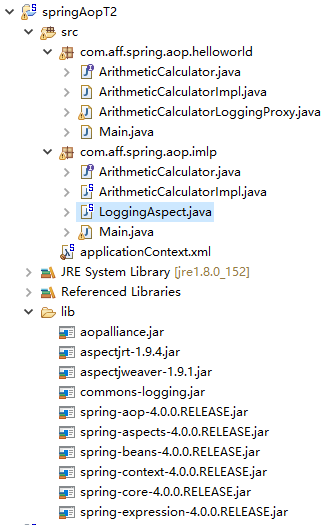1.AOP前奏: 使用动态代理解决日志需求
ArithmeticCalculator.java
package com.aff.spring.aop.helloworld; public interface ArithmeticCalculator { int add(int i,int j); int sub(int i,int j); int mul(int i,int j); int div(int i,int j); }
ArithmeticCalculatorImpl.java
package com.aff.spring.aop.helloworld; public class ArithmeticCalculatorImpl implements ArithmeticCalculator { @Override public int add(int i, int j) { int result = i + j; return result; } @Override public int sub(int i, int j) { int result = i - j; return result; } @Override public int mul(int i, int j) { int result = i * j; return result; } @Override public int div(int i, int j) { int result = i / j; return result; } }
ArithmeticCalculatorLoggingProxy.java
package com.aff.spring.aop.helloworld; import java.lang.reflect.InvocationHandler; import java.lang.reflect.Method; import java.lang.reflect.Proxy; import java.util.Arrays; public class ArithmeticCalculatorLoggingProxy { //要代理的对象 private ArithmeticCalculator target; public ArithmeticCalculatorLoggingProxy(ArithmeticCalculator target) { super(); this.target = target; } //返回代理对象 public ArithmeticCalculator getLoggingProxy(){ ArithmeticCalculator proxy = null; ClassLoader loader = target.getClass().getClassLoader(); Class [] interfaces = new Class[]{ArithmeticCalculator.class}; InvocationHandler h = new InvocationHandler() { /** * proxy: 代理对象。 一般不使用该对象 * method: 正在被调用的方法 * args: 调用方法传入的参数 */ @Override public Object invoke(Object proxy, Method method, Object[] args) throws Throwable { String methodName = method.getName(); //打印日志 System.out.println("[before] The method " + methodName + " begins with " + Arrays.asList(args)); //调用目标方法 Object result = null; try { //前置通知 result = method.invoke(target, args); //返回通知, 可以访问到方法的返回值 } catch (NullPointerException e) { e.printStackTrace(); //异常通知, 可以访问到方法出现的异常 } //后置通知. 因为方法可以能会出异常, 所以访问不到方法的返回值 //打印日志 System.out.println("[after] The method ends with " + result); return result; } }; /** * loader: 代理对象使用的类加载器。 * interfaces: 指定代理对象的类型. 即代理代理对象中可以有哪些方法. * h: 当具体调用代理对象的方法时, 应该如何进行响应, 实际上就是调用 InvocationHandler 的 invoke 方法 */ proxy = (ArithmeticCalculator) Proxy.newProxyInstance(loader, interfaces, h); return proxy; } }
Main.java
package com.aff.spring.aop.helloworld; public class Main { public static void main(String[] args) { ArithmeticCalculator arithmeticCalculator = new ArithmeticCalculatorImpl(); arithmeticCalculator = new ArithmeticCalculatorLoggingProxy(arithmeticCalculator).getLoggingProxy(); int result = arithmeticCalculator.add(11, 12); System.out.println("result:" + result); result = arithmeticCalculator.div(21, 3); System.out.println("result:" + result); } }
结果如下
[before] The method add begins with [11, 12] [after] The method ends with 23 result:23 [before] The method div begins with [21, 3] [after] The method ends with 7 result:7
2.AOP简介
①AOP 的好处:
每个事物逻辑位于一个位置, 代码不分散, 便于维护和升级
业务模块更简洁, 只包含核心业务代码
②.AOP术语
切面(Aspect): 横切关注点(跨越应用程序多个模块的功能)被模块化的特殊对象
通知(Advice): 切面必须要完成的工作
目标(Target): 被通知的对象
代理(Proxy): 向目标对象应用通知之后创建的对象
连接点(Joinpoint):程序执行的某个特定位置:如类某个方法调用前、调用后、方法抛出异常后等。
连接点由两个信息确定:方法表示的程序执行点;相对点表示的方位。例如 ArithmethicCalculator#add() 方法执行前的连接点,执行点为 ArithmethicCalculator#add(); 方位为该方法执行前的位置
切点(pointcut):每个类都拥有多个连接点:例如 ArithmethicCalculator 的所有方法实际上都是连接点,即连接点是程序类中客观存在的事务。AOP 通过切点定位到特定的连接点。类比:连接点相当于数据库中的记录,切点相当于查询条件。切点和连接点不是一对一的关系,一个切点匹配多个连接点,切点通过 org.springframework.aop.Pointcut 接口进行描述,它使用类和方法作为连接点的查询条件。
切面(Aspect): 横切关注点(跨越应用程序多个模块的功能)被模块化的特殊对象
通知(Advice): 切面必须要完成的工作
目标(Target): 被通知的对象
代理(Proxy): 向目标对象应用通知之后创建的对象
连接点(Joinpoint):程序执行的某个特定位置:如类某个方法调用前、调用后、方法抛出异常后等。连接点由两个信息确定:方法表示的程序执行点;相对点表示的方位。例如 ArithmethicCalculator#add() 方法执行前的连接点,执行点为 ArithmethicCalculator#add(); 方位为该方法执行前的位置
切点(pointcut):每个类都拥有多个连接点:例如 ArithmethicCalculator 的所有方法实际上都是连接点,即连接点是程序类中客观存在的事务。AOP 通过切点定位到特定的连接点。类比:连接点相当于数据库中的记录,切点相当于查询条件。切点和连接点不是一对一的关系,一个切点匹配多个连接点,切点通过 org.springframework.aop.Pointcut 接口进行描述,它使用类和方法作为连接点的查询条件。
③用 AspectJ 注解声明切面
要在 Spring 中声明 AspectJ 切面, 只需要在 IOC 容器中将切面声明为 Bean 实例. 当在 Spring IOC 容器中初始化 AspectJ 切面之后, Spring IOC 容器就会为那些与 AspectJ 切面相匹配的 Bean 创建代理.
在 AspectJ 注解中, 切面只是一个带有 @Aspect 注解的 Java 类.
通知是标注有某种注解的简单的 Java 方法.
AspectJ 支持 5 种类型的通知注解:
@Before: 前置通知, 在方法执行之前执行
@After: 后置通知, 在方法执行之后执行
@AfterRunning: 返回通知, 在方法返回结果之后执行
@AfterThrowing: 异常通知, 在方法抛出异常之后
@Around: 环绕通知, 围绕着方法执行
LoggingAspect.java
package com.aff.spring.aop.imlp; import java.util.Arrays; import java.util.List; import org.aspectj.lang.JoinPoint; import org.aspectj.lang.ProceedingJoinPoint; import org.aspectj.lang.annotation.After; import org.aspectj.lang.annotation.AfterReturning; import org.aspectj.lang.annotation.AfterThrowing; import org.aspectj.lang.annotation.Around; import org.aspectj.lang.annotation.Aspect; import org.aspectj.lang.annotation.Before; import org.springframework.stereotype.Component; //把这个类声明为切面,需要把这个类放到IOC容器中, 再声明为一个切面 @Aspect @Component public class LoggingAspect { //声明该方法是一个前置通知, 在目标方法开始之前执行 @Before("execution(* com.aff.spring.aop.imlp.*.*(int , int ))") public void beforeMethod(JoinPoint joinPoint){ String methodName = joinPoint.getSignature().getName(); List<Object> args = Arrays.asList(joinPoint.getArgs()); System.out.println("The method " +methodName+"begins with"+args); } //后置通知:在目标方法执行后(无论 是否发生异常) ,执行的通知 //在后置通知中还不能访问目标方法执行的结果 //第一个*:任意返回值类型; 第二个*:包下的任意类; 第三个*:任意方法; .. : 任意参数 @After("execution(* com.aff.spring.aop.imlp.*.*(..))") public void afterMethod(JoinPoint joinPoint){ String methodName = joinPoint.getSignature().getName(); System.out.println("The method " +methodName+"ends "); } /** * 返回通知 * 在方法正常结束后执行的代码 * 返回通知是可以访问到方法的返回值 * @param joinPoint */ @AfterReturning(value="execution(* com.aff.spring.aop.imlp.*.*(..))",returning="result") public void afterReturning(JoinPoint joinPoint,Object result ){ String methodName = joinPoint.getSignature().getName(); System.out.println("The method " +methodName+"ends with "+result); } /** * 异常通知 * 在目标方法出现异常时 会执行的代码 * 可以访问到异常对象,且可以指定出现特定异常时在执行通知代码 * @param joinPoint * @param ex */ @AfterThrowing(value="execution(* com.aff.spring.aop.imlp.*.*(..))",throwing="e") public void afterThrowing(JoinPoint joinPoint,Exception e){ String methodName = joinPoint.getSignature().getName(); System.out.println("The method " +methodName+"ocurs exception :"+e); } /** * 转绕通知需要携带 ProceedingJoinPoint 类型的参数 * 环绕通知类似于动态代理的全过程: ProceedingJoinPoint 类型的参数可以决定是否执行目标方法 * 且环绕通知必须有返回值 * @param pjd */ @Around("execution(* com.aff.spring.aop.imlp.*.*(..))") public Object aroundMethod(ProceedingJoinPoint pjd){ Object result =null; String methodName= pjd.getSignature().getName(); //执行目标方法 try { //前置通知 System.out.println("The method " +methodName+"begins with"+Arrays.asList(pjd.getArgs())); //执行目标方法 result = pjd.proceed(); //返回通知 System.out.println("The method "+methodName +"end with"+result); } catch (Throwable e) { //异常通知 System.out.println("The method"+methodName+" ocurs exception :"+e); throw new RuntimeException(e); } System.out.println("The method "+methodName +"ends"); return result; } }
Main
package com.aff.spring.aop.imlp; import org.springframework.context.ApplicationContext; import org.springframework.context.support.ClassPathXmlApplicationContext; public class Main { public static void main(String[] args) { ApplicationContext ctx = new ClassPathXmlApplicationContext("applicationContext.xml"); ArithmeticCalculator arithmeticCalculator = ctx.getBean(ArithmeticCalculator.class); int result = arithmeticCalculator.add(2, 3); System.out.println("result:"+result); int result2 = arithmeticCalculator.div(2, 0); System.out.println("result2:"+result2); } }
效果如下
The method addbegins with[2, 3] The method addends The method addends with 5 result:5 The method divbegins with[2, 1] The method divends The method divends with 2 result2:2
目录

3.@Order()注解指定切面的优先级,值越小优先级越高
如:@Order(1)高于@Order(2)
4.重用切点表达式
//把这个类声明为切面,需要把这个类放到IOC容器中, 再声明为一个切面 @Aspect @Component public class LoggingAspect { /** * 定义一个方法, 用于声明切入点表达式,一般,该方法中不再需要添加其他代码 * * @Pointut 声明切点表达式 * 后面的其他通知 直接使用方法名来引用当前的切点表达式 */ @Pointcut("execution(* com.aff.spring.aop.imlp.*.*(int , int ))") public void declareJointPointExpression(){ } //声明该方法是一个前置通知, 在目标方法开始之前执行 @Before("declareJointPointExpression()") public void beforeMethod(JoinPoint joinPoint){ String methodName = joinPoint.getSignature().getName(); List<Object> args = Arrays.asList(joinPoint.getArgs()); System.out.println("The method " +methodName+"begins with"+args); }
}